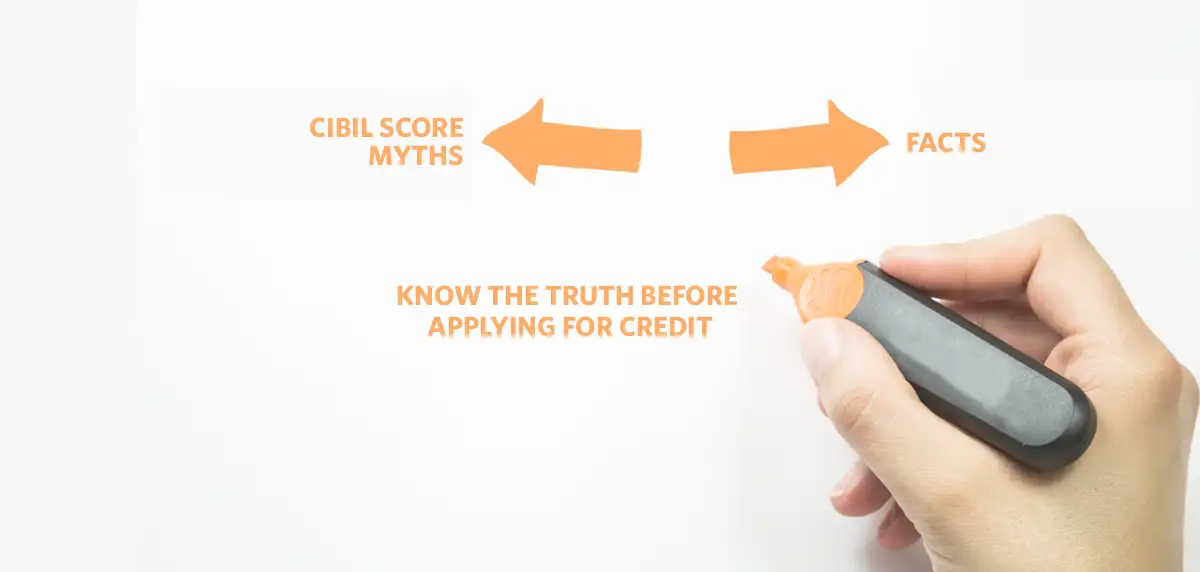With the rapid advance of digitalisation, nearly every financial interaction—leaves a digital trail that can affect your CIBIL score. Whether it be checking your transactions or account balance, or applying for a credit card, all your financial and banking actions leave a digital footprint, some of which likely affects your CIBIL score. Minor fluctuations in this three‑digit number often spark anxiety, as banks and non‑banking financial companies tend to rely on it when evaluating loan applications. With a growing interest in CIBIL score and its importance across the board, it is no wonder that a host of misconceptions about how CIBIL scores work has taken root. Believing these myths can lead to ill‑advised decisions that harm your credit health over the long term. Let’s unpack some of the most common myths about CIBIL score, explain why they’re inaccurate and offer guidance on building and maintaining a robust credit profile.
What is CIBIL Score?
Credit Information Bureau (India) Limited, commonly known as CIBIL, is one of the four credit bureaus authorised by the Reserve Bank of India. As a part of the global TransUnion group, CIBIL collects financial data on more than 400 million individuals and around 32 million businesses in India. It then uses proprietary algorithms to produce a credit score that ranges from 300 (poor) to 900 (excellent).
A higher score indicates disciplined repayment behaviour, low utilisation of credit and a history free of serious defaults. Generally, lenders regard scores above 750 as “good” and extend more favourable interest rates and loan terms to those borrowers.
Conversely, scores below 750 may lead to higher interest charges, stricter collateral requirements, or outright rejection. Since repayment punctuality carries the greatest weight in CIBIL’s scoring model, staying current on EMIs, credit card dues, and other obligations is the single most effective way to boost and preserve your score.
List of Common Myths Surrounding CIBIL Score
Below are eight widely held but erroneous beliefs about CIBIL scores.
Myth 1: CIBIL is the only credit bureau
Many people use “CIBIL score” and “credit score” interchangeably, as though no alternatives exist. In fact, Equifax, Experian, and CRIF High Mark are the other three RBI‑approved credit information companies. Each bureau gathers data from distinct lenders and employs its own scoring methodology, which can cause slight variations in your ratings. Relying solely on the notion of “your CIBIL score” overlooks the broader credit ecosystem and may lead you to miss important insights from other reports.
Myth 2: Frequently checking your score lowers it
It’s a common fear that repeatedly viewing your CIBIL report triggers a negative effect on your credit score. However, that is not entirely true. When you request your own credit file, it results in a soft enquiry that has zero impact on your score. Only hard enquiries, such as those initiated by lenders when you apply for credit, can shave points off your rating. Making it a habit to check CIBIL scores monthly or quarterly is both safe and advisable, as it helps you spot discrepancies and potential fraud early.
Myth 3: A low score means you can never get a loan
While sub‑750 scores can reduce your borrowing options, they do not render loans impossible. Recognised non‑bank lenders and smaller financial institutions often cater specifically to applicants with lower credit ratings. Although these loans may carry higher interest rates, shorter tenures or additional collateral requirements, responsible borrowers with imperfect histories can still access credit when needed.
Myth 4: Once your score is poor, it’ll stay that way
CIBIL scores are dynamic and can improve significantly over time with disciplined financial behaviour. Consistently paying EMIs and credit card bills on or before the due date, maintaining a low credit‑utilisation ratio (ideally below 30 per cent) and avoiding unnecessary hard enquiries all contribute to score recovery, along with a sound investment plan. With patience and prudent money management, moving from a moderate or poor score to above 750 is entirely feasible within 12–18 months.
Myth 5: Closing old credit cards boosts your score
It may seem logical that fewer cards equal less temptation to overspend. But shutting long‑standing accounts can hurt your credit history’s length, which can account for over 15% of your CIBIL score. Lenders favour a long, well‑managed credit record, as it offers a clearer picture of your repayment patterns. Rather than closing old cards, consider retaining them with zero balances and no annual fee to preserve your credit tenure.
Myth 6: Anyone can check my credit report
Your credit file is strictly confidential. Only your entities you explicitly authorise, such as banks and NBFCs during a loan application can access your CIBIL report. Before running a hard enquiry, lenders must obtain your consent, either via a signed form or an online e‑mandate. This privacy safeguard ensures that random parties cannot snoop on your credit history.
Myth 7: Clearing a debt deletes its record
While settling a past‑due account stops further late‑fee penalties, the record of the delay remains on your report for up to seven years. Even after settlement, the fact that you defaulted appears alongside the “settled” status, so future lenders can see the history. More severe events, like bankruptcy, persist for up to ten years. The best strategy is to avoid missed payments entirely, since no amount of back‑dating will erase a delinquency flag.
Myth 8: Zero credit history is advantageous
Having no borrowing record might sound ideal, but it leaves lenders without evidence of your reliability. An absence of credit usage is interpreted as higher risk, because there’s nothing to demonstrate your ability to repay. Building a modest credit history by taking out a small loan or using a credit card responsibly, then clearing dues punctually sends a far stronger signal of trustworthiness than an untouched “blank slate.”
Myths surrounding important considerations are best dispelled by consulting experts, relying on trustworthy sources, and discouraging baseless misinformation. When it comes to CIBIL score, you can focus on proven strategies, such as maintaining low balances, making timely payments, and periodically reviewing credit bureau reports, to strengthen your CIBIL score. Remember, credit health is a journey, not a one‑time destination. Informed decisions like sound credit usage and a smart investment strategy today pave the way for greater financial freedom tomorrow.





















